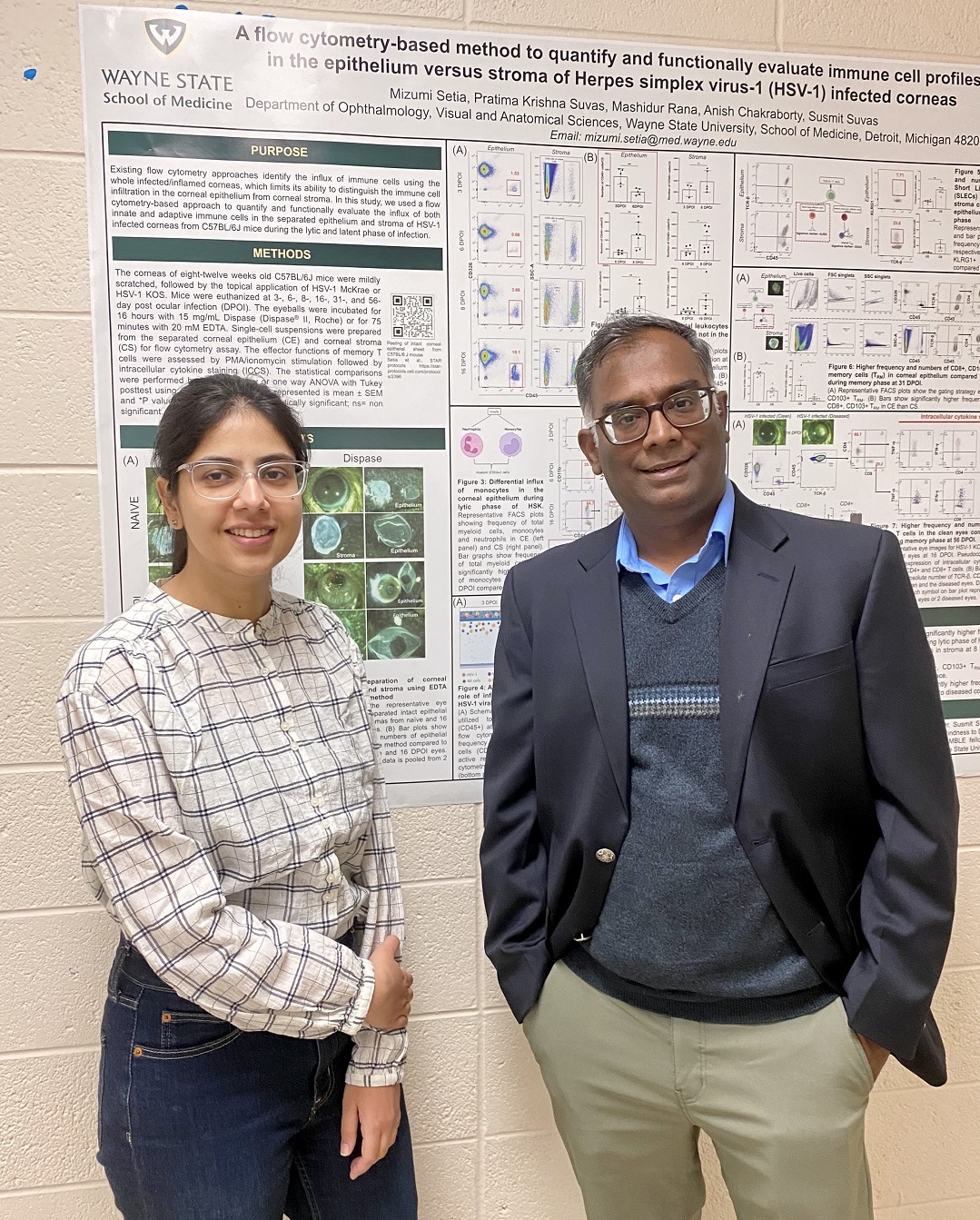Mizumi Setia’s effort as a doctoral student in the Wayne State University School of Medicine studying a leading cause of infection-induced blindness in the United States has earned her a double dose of recognition from the world’s largest eye and vision research organization.

Setia is the runner-up of the 2023 Cora Verhagen Award, announced at the Association for Research in Vision and Ophthalmology’s annual meeting held April 23-27 in New Orleans. The award is given to the best poster or paper presented by a graduate student or post-doctoral fellow in the Immunology session. A week later, she found out she won second place in ARVO’s Raniyah Ramadan Foundation Young Investigator Award in Microbiology. The Ramadan award is given for best Ocular Microbiology poster or paper presentation by a graduate student or postdoctoral fellow at the same meeting.
The awards will be presented at ARVO 2024 in Seattle.
“I feel immensely grateful to have had the opportunity to present my work at the largest vision research conference alongside such accomplished peers in the field,” she said. “These awards hold great significance for me as they validate the time and effort I have dedicated to my research. I would like to express my sincere appreciation to my mentor, Dr. Susmit Suvas and my colleagues for their guidance and encouragement throughout the journey. The recognition of receiving these prestigious awards serves as an incredible source of motivation for me to strive for excellence in my research work and create a positive impact within the scientific community.”
Setia was admitted to the doctoral program of Anatomy and Cell Biology in the fall of 2019, and joined the lab of Professor of Ophthalmology, Visual and Anatomical Sciences Susmit Suvas, Ph.D., after finishing her lab rotations in 2020.
“Receiving second position for both (awards) in the same year at ARVO is an exemplary achievement for a doctoral student,” Dr. Suvas said. “These awards truly recognize the accomplishments of Mizumi’s research work. As a mentor, I am proud of her achievements and wish her the best as she prepares to graduate from my lab in the winter semester of 2024.”
With him, she researches the alterations in the corneal epithelial layer and how it influences the HSV-1 clearance during the lytic phase and the development of immunoinflammatory condition, Herpetic stromal keratitis, or HSK.
“In the last three and half years, Mizumi worked hard to accomplish her research goals,” Dr. Suvas said. “Recently, Mizumi developed an approach to quantify and functionally evaluate the immune cells infiltrating the outermost layer, known as the epithelium, of HSV-1-infected corneas. This approach has broader applications for scientists working on corneal inflammatory conditions, such as dry eye, corneal wound healing and microbial keratitis. Knowing what types of immune cells infiltrate the epithelial layer of the inflamed cornea can help design strategies to target these cells and control unwanted corneal inflammation. Considering the broader application of the work presented by Mizumi in the ARVO annual meeting, these two accolades suitably reward her curiosity, hard work and passion for scientific research.”
Setia’s initial first-author publication in STAR protocols (Cell Press) presented a flow cytometry-based protocol to quantitate the differential immune cell influx in the corneal epithelium versus the corneal stroma in HSK eyes. “I hope this protocol will become a valuable resource for the scientific community, aiding in our understanding of immune cell infiltration in the HSK eyes and potentially finding applications in studying the immune cell dynamics in other ocular inflammatory conditions, such as bacterial keratitis and Sjögren's syndrome. Engaging in continuous learning and innovative thinking that allows me to push my boundaries and make meaningful contributions to society make my doctoral journey truly rewarding and fulfilling,” she said.
Setia received her bachelor’s degree in microbiology with honors from Panjab University in Chandigarh, India. She selected Wayne State for graduate school because of its high academic reputation in the field of biomedical research.
“The research programs at Wayne State University aligned closely with my academic and career aspirations. Furthermore, the multicultural environment, the state-of-the-art research facilities and ample opportunities for interdisciplinary collaborations made it the ideal choice for me to pursue my doctoral degree,” she said. “Additionally, my fascination with the intricacies of our immune system and Dr. Suvas’s expertise in the field of immunology as evidenced by his extensive publications in highly reputed journals prompted me to rotate in his lab during the months of January-February 2020. During my rotation period, I gained a deeper understanding about the ongoing projects in the lab, which aim to unravel the complexities of immunopathogenesis of Herpetic stromal keratitis. Dr. Suvas’s open-door policy, mentoring style, unwavering support and guidance were some of the major factors that strengthened my decision to join his lab as a graduate student.”